|
|
| |
■
『世界の英語教室 (小学校)』
「番外編・フィンランドの教科書」
"English textbook for elementary school students in Finland"
By Mina Hisada/Illastaration by Puri
 |
|
どうして僕ばっかり・・・
|
いじめや体型コンプレックス、倦怠感といった問題は、日本の子供たちだけでなく、世界各国の子どもに共通する悩みです。ですが、そんな「悩み」にしっかり答えてくれるのがフィンランドの英語の教科書。さぁ、早速中をのぞいてみましょう
(Japanese children are not the only ones to suffer from bullying, body image issues and fatigue. Children around the world have to face these problems every day. English textbooks in Finland deal directly with these issues, and let's have a look at how they do this.)
(※フィンランドの英語教育は一般的に3年生からスタートするため、低学年では英語の授業はありません。)
(※In Finland, English education normally starts from grade 3.)
|
◆
まずは中学年から。動物をテーマにした話が多い。
(Firstly, let's have a look at a textbook for grade 3 and 4 elementary school students. They feature many stories about animals.)
(以下は小学3年生の教科書から)
(Below is the textbook for grade 3 students.)
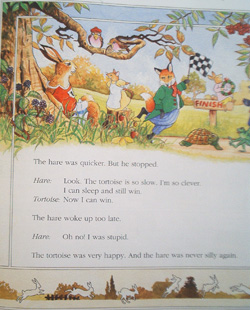 ■「うさぎとかめ」
■「うさぎとかめ」
("The Hare and the Tortoise")
|
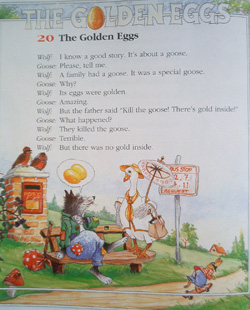 ■金の卵
■金の卵
("The Goose That Laid the Golden Eggs" )
|
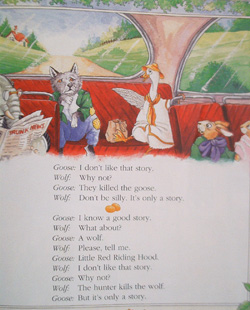 ■だちょうとオオカミ
■だちょうとオオカミ
("The Goose and Wolf" )
|
|
筆者のコメント:
手始めにイソップ物語のぐう話が掲載されている。日本の英語教科書でも、例えば、「日本の昔話」を載せるというのはどうだろうか?
Comment: The textbook includes Aesop's Fables. Suggestion: How about putting Japanese folk tales in English textbooks in Japan?
| |
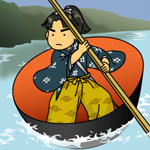
|
◆
続いて高学年。実生活に基づいた内容が多い。
(Below is the textbook for grade 5 and 6 elementary school students.
The contents are based on the kids' daily life.)
(以下は小学6年生の教科書から)
(Below is a grade 6 textbook.)
■匿名の悩み相談。Q&A式でアドバイス。
(Counseling)
小学生が各自の悩みを匿名で保健婦さん(Ria)に相談し、答えてもらうというコーナーです。
(Kids write to school nurse Ria, using assumed names, about the problems they are facing. Ria writes back giving them advice.)
☆<悩み相談その1- いじめ編>
(Problem 1- bullying)
Dear Ria,
(親愛なるリアへ)
I have been in this school for nearly two months.
(この学校にきて2ヵ月近くたちます。)
I've had difficulties with some of the pupils. What can I do?
(いじめにあっています。どうしたらいいでしょうか?)
Yours, Tiny Tears
(小さな涙ちゃんより)
| |
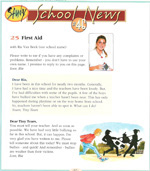 ↑全文はこちらをクリック!
↑全文はこちらをクリック!
|
Dear Tiny Tears,
(親愛なる小さな涙ちゃんへ)
We have had very little bullying so far in this school. But, it can happen.
(この学校ではいじめはあまりないけれど、起こりうる問題ではあるのよね。)
We must stop bullies - and quick!
(いじめは絶対にだめ! すぐになくさなければ!)
You must tell your teacher.
(まずは担任の先生に言ってみることね。)
Love, Ria
(リアより)
|
☆<悩み相談その2- 体型編>
(Problem 2 - "body image issues" )
Dear Ria,
(親愛なるリアへ)
I've had a weight problem ever since I was born.
(僕、生まれつき太っているのが悩みなんだ。)
Other children have always made fun of me, particularly the skinny ones.
(いっつもみんなから--特にやせてる子から--からかわれるんだ。)
| |
 ↑全文はこちらをクリック!
↑全文はこちらをクリック!
|
Dear Walrus,
(親愛なるウォールスへ)
Anyway, the right kind of food, lots of exercise and lots and lots of fun will help. There are many ways of helping you.
(きちんとした食事と運動と楽しみが大事。いろんな解決方法があるわ。 )
And don't worry about those skinny-lazies. They have their own problems.
( それに・・・気にしちゃだめ。彼らには彼らの悩みがあるんだから。)
Love, Ria
(リアより)
|
☆<悩み相談その3- 疲労編>
(Problem 3 - "Fatigue")
Dear Ria,
(親愛なるリアへ)
I'm tired all the time at school.
(いつも学校で疲れています。)
I've been particularly tired on Mondays.
( 特に月曜日がダメです。)
What's wrong with me?
(私ってどこかおかしいのでしょうか?)
Yours, Sleepy Head
(寝むたがり屋より)
|
|
 ↑全文はこちらをクリック!
↑全文はこちらをクリック!
|
|
Dear Sleepy Head,
(親愛なる寝むたがり屋さんへ)
What have you been doing at the weekends?
(週末はどう過ごしているの?)
Try to go to bed before 9 o'clock every night.
(毎晩九時前にはベッドに入るようにしましょうね。)
Take a book to bed with you and read yourself to sleep, if necessary.
(寝る前に本を読んでもいいかもしれないわ。)
Love, Ria
(リアより)
|
コメント:この悩み相談コーナーでは、手紙の書き方("Dear 〜 で始まり、
"Love, 〜" "Yours,〜" などで終わる)が学習できるようになっている。
Comment: Here, students can learn about how to write a letter in English. Letters start with "Dear 〜" and end with "Love, 〜" Yours, 〜" .
|
※いじめ(bullying)についての相談の下に、お相撲さんのイラストとともに、
"Pinch yourself and know how others feel." (わが身をつねって人の痛さを知れ)ということわざを紹介している。
(The proverb "Pinch yourself and know how others feel," which crops up in the bullying section, is taken from Japanese. It originally appeared in a picture of sumo wrestlers.)

↑表をクリックすると実物大になります。
|
■パソコンが得意な生徒と苦手な生徒のやりとりを会話形式で紹介。
(Conversation between two students:
One is good at computers, and the other
is bad at computers and has an inferiority complex about that.)
タイトル:どうしたの?
Title: (What's the problem?)
あらすじ:カリナ(Karina)はクラスで一番インターネットやパソコンを使うのが得意です。ジョーシュ(Josh)はクラスでパソコンが一番苦手だと思っています。(本当は単にあきらめが早いだけなのに!)
Story: Karina is the best student for using Internet and Personal Computer in a class.
Josh thinks he is the worst among them, for that.
(Actually, he just needs to be more tenacious! He gives up so quickly.)
<前半>
Josh: I'm no good at this. I give up.
(あー、もうだめ。お手上げだよ。)
Karina: What's the problem, Josh? Is there anything I can do to help?
(どうしたのよ、ジョーシュ。私に何かできることある?)
Josh: I always get lost on the Internet.
(ネットにはいつも手こずるんだ。)
Karina: Perhaps you should do things more slowly. There's no rush, you know.
(ゆっくりやればいいのよ。あせる必要なんかないわ。)
| |
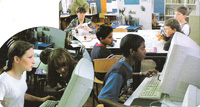 ↑全文はこちらをクリック!
↑全文はこちらをクリック!
|
<後半>
Karina: Let me have a look. Oh, you're right. We'lll have to restart the computer.
(ちょっと見せて。あー、ほんとだ。再起動しなきゃね。)
Josh: Boring. I've had enough of computers for today. I'm going to find a good book to read.
(もういやだよぉ。今日はパソコンこりごりだ。家に帰って本でも読みたいよ。)
Karina: OK. Have it your way!.... That's strange. Nothing happened when I clicked the restart command.
(いいわ。好きなようにして。…変よ。再起動クリックしても動かなくなっちゃった)
Josh: Oh no. It's some kind of virus on the Internet.
(やめてくれー。ネットにウィルスが入っちゃったんじゃないだろうね)
|
|
 ↑全文はこちらをクリック!
↑全文はこちらをクリック!
|
筆者のコメント:ここでもことわざ登場。"Knowledge is power. "
(知は力なり)
Comment: Here, we have another proverb: "Knowledge is power."

↑表をクリックすると実物大になります。
|
★フィンランドの教科書から学ぶ表現
(Learn some expressions from an English textbook from Finland.)
It can happen.
(ありうることだ)
⇒"We have had very little bullying so far in this school. But, it can happen."
(この学校ではいじめはあまりないけれど、起こりうる問題ではあるのよね。)
There's no rush.
(急ぐことなんかない)
⇒"Perhaps you should do things more slowly. There's no rush, you know."
(あせる必要なんかないわ。ゆっくりやればいいのよ〔急ぐことなんかない〕。)
Have it your way!
(お好きなように!)
⇒(何かに手こずっている友達に対して)
"Have it your way! "(お好きなように!)
☆★編集吐息☆★
 |
|
うれしいな・・・
|
わー! 何て興味深いのだろう! まるでどこかの国のお昼の番組のように「お悩み相談室」が英語の教科書に載せられている。この教科書には、当然のことながら賛否両論あるだろう。あまりに画期的すぎると思う人、実践的だと思う人、やりすぎではないかと思う人、これが私の教科書だったら今ごろ英語が好きになっただろうに!と思う人…。
「思う」のはわれわれに与えられた特権。何を思ったっていい。何を感じたっていい。ただ、これだけこなれた実践的な会話が掲載された教科書が使える背景には、一つには普段から生の英語に触れている--字幕スーパー付きのテレビ番組がほとんど--ことが挙げられるだろう。いわゆる"This is a pen." " Is this your pencil?"といったお堅い教科書で教育された私にとって、物珍しく、ある意味うらやましい教科書であった。
(Wow! This is interesting. It's like they've combined a daytime talk show and English textbook, and presents both sides of each issue. This might not be to everyone's taste, but an equal number of people think it's practical, appropriate, and that if they'd just had a similar textbook when they were learning English, they would have actually liked learning English. That's just their opinion. We can think whatever we want to think, we can feel whatever we want to feel, that's our prerogative.
But whatever they say, it's undeniable that the English found in Finnish textbooks is natural, and I think the reasons for this stems from a similar approach to television, where all programs in English are subtitled rather than dubbed. My own English education was very much of the "this is a pen" or "is that your pencil?" school of artificial, stilted English, and I look at what the Finnish are doing and I can't help but feel a little jealous.)
|
|
|
|
